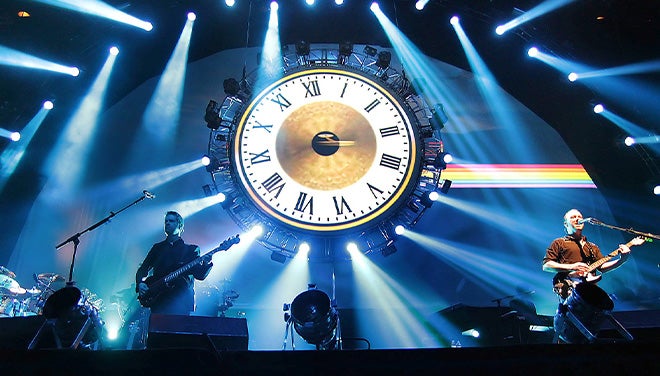News
Does Brit Floyd pay royalties to Pink Floyd?

In the world of music, where artistic creativity and intellectual property intertwine, questions often arise about royalties, copyright, and the complex web of legal and financial arrangements that govern the use of music. One such intriguing question that has piqued the curiosity of many music enthusiasts is, “Does Brit Floyd pay royalties to Pink Floyd?”.
Table of Contents
Who is Brit Floyd?
Brit Floyd is a British Pink Floyd tribute band renowned for its astonishing live performances that capture the essence of Pink Floyd’s music. Established in 2011, the band has garnered a global following and has been praised for its ability to recreate the iconic sound and visuals of Pink Floyd’s legendary concerts.
Brit Floyd’s performances typically include a wide range of Pink Floyd’s classic songs, spanning their entire discography, from albums like “The Dark Side of the Moon”, “Wish You Were Here”, “Animals“, and “The Wall“, among others. They are known for their meticulous attention to detail in replicating the sound and visuals of Pink Floyd’s original concerts, including elaborate light shows, projections, and stage setups.
The Tribute Band Phenomenon
Tribute bands are a unique phenomenon in the music industry. They pay homage to established artists and bands by faithfully recreating their music and stage presence. Brit Floyd is no exception; they meticulously replicate Pink Floyd’s songs, complete with elaborate light shows, visual effects, and even the iconic inflatable pig.
The Copyright Conundrum
Now, let’s address the elephant in the room – copyright. Copyright laws are designed to protect the intellectual property of artists and musicians. When it comes to tribute bands like Brit Floyd, the question of copyright infringement often arises.
Copyright Ownership: Pink Floyd’s music is protected by copyright, and the band members, songwriters, and their estates hold the rights to their songs. This means that any public performance or reproduction of Pink Floyd’s music, even if performed by a tribute band, falls under the purview of copyright law.
The Licensing Solution
To legally perform and profit from the music of Pink Floyd, tribute bands like Brit Floyd typically obtain licenses and permissions. These licenses, often facilitated through music licensing organizations, grant them the right to perform the songs and distribute recordings while compensating the original creators and rights holders.
Performance Rights: Tribute bands acquire performance rights licenses, which allow them to perform Pink Floyd’s songs in public. This includes concerts, music festivals, and other live events. These licenses ensure that the original artists and songwriters receive their fair share of royalties generated from these performances.
Mechanical Licenses: For recording and distributing cover versions of Pink Floyd’s songs, tribute bands secure mechanical licenses. These licenses enable them to create and sell recordings of the songs, such as albums or digital downloads, while still paying royalties to the original copyright holders.
Do Tribute Bands Pay Royalties To Original Artists?
In many cases, it is the responsibility of the venues where tribute bands perform to obtain the necessary licenses and permissions for the public performance of copyrighted music. Venues, such as concert halls, clubs, and theaters, often have agreements with performing rights organizations (PROs) like ASCAP, BMI, or SESAC to ensure that they are compliant with copyright laws.
These PROs collect fees from venues and distribute royalties to the copyright holders, including the original artists and songwriters. This arrangement allows venues to host live music performances, including those by tribute bands, without the performers themselves having to directly negotiate licenses or pay royalties.
So, while tribute bands may not typically bear the responsibility of obtaining licenses and paying royalties, it’s usually the venues that handle these matters to ensure that they are in compliance with copyright regulations when hosting such performances.
The Financial Arrangements
While the specifics of these arrangements may not be publicly disclosed, we can make some educated assumptions based on industry practices.
Revenue Sharing: It is likely that Brit Floyd and Pink Floyd have a revenue-sharing agreement in place. This means that a portion of the earnings generated by Brit Floyd’s performances and merchandise sales goes to Pink Floyd or their designated rights holders as royalties.
Performance Royalties: Every time Brit Floyd performs a Pink Floyd song in a concert, the original creators and rights holders are entitled to receive performance royalties. These royalties are typically calculated based on factors such as the venue size, ticket sales, and the duration of the performance.
Merchandise Sales: Tribute bands often sell merchandise such as t-shirts, posters, and albums featuring the original band’s branding. In these cases, a percentage of the merchandise sales revenue may also go to Pink Floyd as part of the licensing agreement.
Conclusion
In conclusion, tribute bands like Brit Floyd typically do not directly pay royalties to the original artists, in this case, Pink Floyd. Instead, it is the responsibility of the venues where these tribute bands perform to handle matters related to copyright licenses and royalties. These venues often have agreements with performing rights organizations to ensure compliance with copyright laws, allowing tribute bands to perform the music of the original artists without individually negotiating licenses or royalty payments. This arrangement simplifies the process and ensures that both the tribute bands and the venues can continue to pay homage to the music of iconic artists while adhering to copyright regulations.




